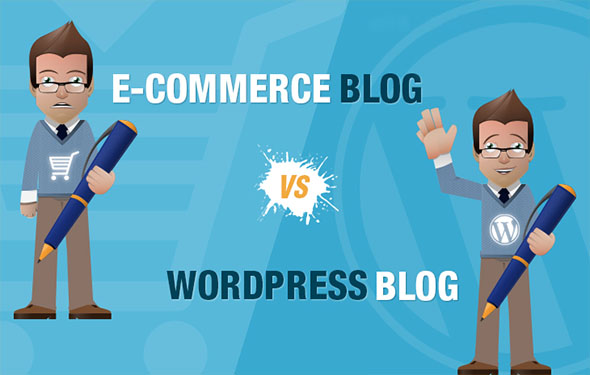E-Commerce Blog V/S WordPress Blog
Know Which is the Most Appropriate One to Explore Your Business in Dubai, UAE
In order to start a business, a strong and unique website is a must. It is represented as the mirror of your business as it consists of all the essential information about the products and services that you want to sell. So, now, if you are wondering to start your own blogging site in Dubai, UAE, it is important to choose the most effective and the best platform that will suit your purpose. However, with so many platforms available today, it becomes really tough to choose the right one. Therefore, in this article, we will guide you about eCommerce blogging and WordPress blogging that will provide you a detailed idea for choosing the best one.
Take a Look at the Differences between eCommerce And WordPress Blogs
eCommerce Blog
I) Bigcommerce
BigCommerce is one of the best eCommerce platforms that is widely used these days. Because of the software which is an SaaS-based shopping cart, it provides an extremely easy interface to the users. With amazing features and functionalities, BigCommerce is ruling the field of eCommerce. Besides this, it also provides you the privileges to sell your offerings with multiple currency support across the world. This is the reason why it is highly preferred by business owners as it helps in providing excellent user-experience and increases revenue. For better clarification, look at the benefits and drawbacks of the Bigcommerce platform:
Benefits:
- On a BigCommerce store, the blogs are mobile friendly.
- The blogs that are developed here have a good SEO friendliness.
- It has built-in marketing features.
- User friendly admin page is also available here
Drawbacks:
- It is one of the less flexible solutions, if you want to work with blogs on BigCommerce.
- The blog page tweaks are quite complicated. Here, you have to hire expert developers for making the edits in HTML/CSS code for your store.
- Limitations are there regarding UI which creates difficulty in designing all the blog elements based on your requirement.
- Absence of third party plugins which enables your blog to be better available in BigCommerce.
- The blog developed in BigCommerce does not support multiple languages.
2)Shopify
Shopify is the second best eCommerce platform that offers a wide variety of features to develop a robust online enterprise. It comes as a full-package of solutions to fulfill all your business needs with ease. The features that are available here enable you to customize your storefront easily, organize your merchandise and track records of the products and orders with just a few clicks. The language used in the store’s administrative interface is English while other languages are used for other purposes. Hence, it is best suited for all types of business regardless of the size.
Benefits:
- Here, you can easily set up a responsive website.
- From the app store, you can easily add powerful features.
- To manage tweaks, it is quite easy for your team.
- Best eCommerce platform for website development
Drawbacks
- The dependence on the third party apps is more which adversely affects the quality and cost.
- As it has content limitation, creative bloggers won’t get 100% satisfaction.
- The blog layout is quite limited.
- They need another blogging platform, to do something that is unusual.
3) 3DCart
3DCart is your ideal choice in case you want to sell products online. The built-in features that are available here basically focus on designing, creating, marketing, and managing your store in the best possible way. Maintaining offline as well as online payments become quite easy here. Other than this, dealing with your inventories, and setting up real-time delivery options are a huge added benefit. This platform doesn’t require any expert programming knowledge and hence can be used by anyone.
Benefits:
- 3DCart is easy to use and customise.
- With the same domain name as the website/store, it creates blogs that increase your SEO.
- For each blog that you post, you can add Google+ profile credentials.
- For owners and an easy frontend for customers, it provides an user-friendly admin backend.
- Fully integrated with POS
Drawbacks:
-
On the home page, you are limited to 25 blog posts.
-
With plan, it has limited bandwidth.
-
To enable recurring billing system, you have to use third-party apps.
4) SEO Shop
If you want your business to easily index its pages on search engines, SEO Shop is the best platform to create a unique online store. It basically focuses on improving the SERP rankings that effectively helps to increase traffic on your website. As a result, you will get an increased rate of conversion leads and great sales.
Benefits:
- Beneficial to manage global operations
- Stay updated with the search engine algorithms and requirements
- You can get the list of “Recent Articles”
Drawbacks:
- To modify the structure of the blog, it is packed with limited functionality
- In order to customise the blog, no extra plug-in or third party tool is available and is only done with CSS
- Only the “Recent Articles” list can be viewed but no list of “Popular Articles” is available.
- Poor community support
WordPress Blog
WordPress is one of the best website creation tools which is specifically written in PHP. Due to the unique and unmatched features that it offers, it is easy for commanding blog content management system. This is the reason why it has been the most popular platform which is used by a number of users these days. Besides this, it also works with plug-ins and extensions including eCommerce.
Benefits:
- It is free to use WordPress blog
- The setup is simple.
- SEO-optimized.
- To customise blogs, free plugins are available.
- List of “Popular Articles” are easily available.
- Great community support
- User-friendly administration system and open-source status are available here.
- You can easily get the list of “Popular Articles” in WordPress.
- WordPress is the most suitable for you if your company totally relies on blogging because it revolves around blogging and efficiently utilizes SEO optimization.
After understanding the features and drawbacks of eCommerce and WordPress blogs, it will be much easier for you to get the best platform to make your business shine. Also, let us know your opinion in the comments section below.
Frequently Asked Questions
- Can I blog on Shopify?
In the online store navigation, you can add a link to a blog hosted on a third-party platform such as WordPress, Tumblr, and Blogger. In your main navigation or within a menu, the link will appear, depending on what you choose. In the Navigation area of Shopify, you can set up menus and links.
- How do I link WordPress to Shopify?
- Sign up to Shopify. The first thing we need is a Shopify account
- Install the Shopify Ecommerce Plugin
- Connect Shopify to WordPress
- Add a Product
- Set up Payment Options
- Configure Shipping
- Add Shopify Products to Your WordPress Website
- Adding Product Widgets.
- How does Shopify improve SEO?
- Determine which keyword you want to rank for.
- Write search engine optimized content for that keyword.
- Use descriptive image names.
- Use the alt tags for image names.
- Write your title and meta description like advertisements.
- Can WordPress do eCommerce?
Before, WordPress was just a blogging platform. However, these days, it has become quite complicated and it effectively helps to create and manage various kinds of websites, which also include ecommerce. The best platform for ecommerce are Magento, Shopify, and OpenCart.




